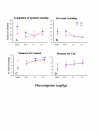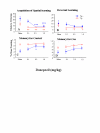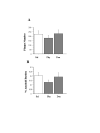Acetylcholinesterase inhibitors ameliorate behavioral deficits in the Tg2576 mouse model of Alzheimer's disease
- PMID: 15778881
- PMCID: PMC1361685
- DOI: 10.1007/s00213-005-2230-6
Acetylcholinesterase inhibitors ameliorate behavioral deficits in the Tg2576 mouse model of Alzheimer's disease
Abstract
Rationale: Acetylcholinesterase inhibitors are widely used for the treatment of patients with Alzheimer's disease (AD). However, the relationship between the capacity of such drugs to ameliorate the symptoms of AD and their ability to alter the underlying disease process is not well understood. Transgenic mice that overexpress the human form of amyloid precursor protein and develop deposits of beta-amyloid (Abeta) and behavioral deficits during adulthood are useful for investigating this question.
Objectives: The effects of administration of two acetylcholinesterase inhibitors, physostigmine and donepezil, on Abeta plaque formation and memory-related behaviors were investigated in the Tg2576-transgenic mouse model of AD. At 9-10 months of age, Tg2576-transgenic [Tg(+)] mice develop Abeta plaques and impairments on paradigms related to learning and memory as compared to transgene-negative [Tg(-)] mice.
Methods: Beginning at 9 months of age, increasing doses of physostigmine (0.03, 0.1, and 0.3 mg/kg), donepezil (0.1, 0.3, and 1.0 mg/kg), or saline were administered over 6 weeks to cohorts of Tg(+) and Tg(-) mice. Performance on tests of spatial reversal learning and fear conditioning was evaluated at each drug dose throughout the period of drug administration. After drug administration was completed, the animals were sacrificed and Abeta plaque number was quantified.
Results: Administration of physostigmine and donepezil improved deficits in contextual and cued memory in Tg(+) mice so that their behaviors became more similar to Tg(-) mice. However, administration of physostigmine and donepezil tended to improve cued memory and deficits in spatial learning in both Tg(+) and Tg(-) mice. Physostigmine administration demonstrated more prominent effects in improving contextual memory than donepezil, while donepezil was more effective than physostigmine in improving deficits in the acquisition of the spatial memory paradigm. Administration of neither drug altered the deposition of Abeta plaques.
Conclusions: These studies suggest that acetylcholinesterase inhibitors can ameliorate memory deficits in Tg(+) mice without necessarily altering the deposition of Abeta plaques. Tg2576 mice may be useful as an animal model to further investigate the mechanisms by which aceytlcholinesterase inhibitors improve cognitive deficits in patients with AD.
Figures



References
-
- Apelt J, Kumar A, Schliebs R. Impairment of cholinergic neurotransmission in adult and aged transgenic Tg2576 mouse brain expressing the Swedish mutation of human beta-amyloid precursor protein. Brain Res. 2002;953:17–30. - PubMed
-
- Bardgett ME, Boeckman R, Krochmal D, Fernando H, Ahrens R, Csernansky JG. NMDA receptor blockade and hippocampal neuronal loss impair fear conditioning and position habit reversal in C57Bl/6 mice. Brain Res Bull. 2003;60:131–142. - PubMed
-
- Bartolini M, Bertucci C, Vavrini V, Andrisano V. Beta-amyloid aggregation induced by human acetylcholinesterase: Inhibition studies. Biochem Pharmacol. 2003;65:407–416. - PubMed
-
- Beach TG, Kuo Y, Schwab C, Walker D, Roher A. Reduction of cortical amyloid levels in guinea pig brain after systemic administration of physostigmine. Neuroscience Letters. 2001;310:21–24. - PubMed
Publication types
MeSH terms
Substances
Grants and funding
LinkOut - more resources
Full Text Sources
Other Literature Sources
Medical
Miscellaneous

